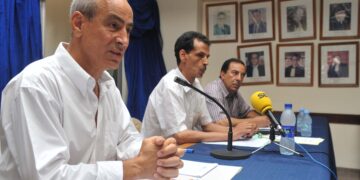Failure to curb conflict risks massive loss of civilian life, spread of conflict to region
(Washington, D.C., October 9, 2023): The United Nations Security Council (UNSC) and the General Assembly should call for an immediate ceasefire between Israel, Hamas, and other Palestinian armed groups and the immediate return of all civilians held as hostage by Hamas in Gaza, Democracy for the Arab World Now (DAWN) said in a statement released today.
The international community should recognize that unless it secures an immediate ceasefire, the conflict risks spreading throughout the region. The United States government should work with other UNSC members to pass and ensure full compliance with an immediate ceasefire.
"Hundreds of Israeli and Palestinian civilians have already been killed, and unless the Security Council intervenes to demand a ceasefire, more civilians, but particularly Palestinian civilians in Gaza are almost guaranteed to suffer a catastrophe the scope of which not even they have endured," said Michael Schaeffer Omer-Man, Director of Research for Israel-Palestine at DAWN. "At the same time, this moment demands that the international community start to recognize and address the root causes—apartheid, occupation, and siege."
On October 7, hundreds of fighters from Palestinian armed groups, including Hamas and Islamic Jihad, infiltrated Israel in an unprecedented attack on Israeli towns, killing over 800 and taking over 100 Israeli soldiers and civilians into Gaza. Israel has responded by declaring war on Gaza, launching hundreds of airstrikes, and cutting off the electricity to the area. On October 9, Israeli Minister of Defense Yoav Gallant ordered a "complete siege" on Gaza, cutting off food, fuel and electricity to Palestinians in the coastal strip, and Prime Minister Netanyahu told civilians in Gaza, who have nowhere to flee or seek safety, to "leave now" and Israel called up 300,000 military reservists.
According to media reports, as of October 9, over 800 Israelis and 500 Palestinians had been killed and over 6,000 injured on both sides since October 7; these numbers continue to rise with ongoing bombing and fighting. In Gaza, more than 120,000 Palestinians have been displaced as a result of the destruction of apartment buildings and homes by the Israeli military, according to the United Nations.
The UNSC is authorized to issue ceasefire directives, which are binding on states, pursuant to Chapter VII of the UN Charter. In 2021, the United States intervened on three occasions to block efforts at the UNSC to call for a ceasefire in Gaza. The UNSC also should set a 60-day timeline from the cessation of fighting for Israel to lift its blockade on Gaza, ensure the delivery of humanitarian assistance to Gaza and demand the creation of a humanitarian corridor from Egypt.
"The international community is right in condemning the murder of hundreds of Israeli civilians for what it is, an atrocity, but it cannot allow that tragedy to give Israel carte blanche for its own massacres of Palestinians," said Sarah Leah Whitson, Executive Director of DAWN. "Netanyahu telling Palestinians in Gaza to flee, knowing full well they have nowhere to go, should push the world to stop this snowballing tragedy from stealing even more lives."
In addition, the International Criminal Court should remind all parties to the conflict that it has jurisdiction over the Gaza Strip, West Bank, and East Jerusalem in its investigation of international crimes there since 2014. Targeting civilians—in their homes and communities, on the roads, or at a dance festival—is a war crime. The Special Prosecutor urgently should send a team to investigate war crimes and other crimes under the Rome Statute, similar to the team of 42 investigators, forensic experts and support personnel he has deployed to Ukraine to investigate crimes falling into the jurisdiction of the International Criminal Court.
Israel has been occupying Palestinian territories, including Gaza, since 1967. While Israel removed its troops from Gaza in 2005, the international law community, including the International Committee of the Red Cross, continues to recognize Gaza as occupied territory. Since 2006, Israel has maintained a siege on Gaza.
In the most recent fighting, Hamas has engaged in gross violations of international humanitarian law. The group's attack on an outdoor dance party and in nearly two dozen Israeli communities in southern Israel, appears to be a deliberate attack on civilians, which constitute war crimes. In addition, it has taken dozens of civilians, including children, women and elderly persons, as apparent hostages in violation of the laws of war, suggesting that it hopes to swap the civilians and soldiers it is holding for Palestinian prisoners held by Israel, including over 1,000 held in administrative detention without charge or trial. Video evidence has also shown Palestinian fighters desecrating the corpses of Israelis and abusing and beating Israeli captives.
Israel's indiscriminate bombardment of a 14-story civilian apartment building in Gaza City on October 8, as well as its attack on the Indonesian Hospital in the north of Gaza, are also apparent war crimes. Iyad al-Bozom, spokesman of the Gaza-based Interior Ministry, said Israeli warplanes have carried out hundreds of airstrikes on different targets across Gaza since the most recent fighting began.
Israel also has shut off the electricity to Gaza, harming civilians and hospitals, as the area relies almost entirely on electricity purchased from Israel. Under the Additional Protocol to the Geneva Conventions, attacks against objects indispensable to the civilian population, like electricity, are prohibited and a gross violation of international humanitarian law. The UNSC should demand the immediate restoration of electricity from Israel and ensure enough fuel is provisioned via Egypt so that the sole plant in Gaza can produce its own electricity.
Israeli Prime Minister Benjamin Netanyahu recently warned "the residents of Gaza: Leave now because we will operate forcefully everywhere," but the complete closure of Gaza's borders since 2006 means civilians in one of the most densely populated parts of the world have nowhere to seek safety. Under international law, while parties to a conflict have a duty to warn civilians, such warnings do not absolve the parties from the requirement to avoid targeting or indiscriminately striking civilians.
There is also a serious risk that the war could spread to the West Bank and other countries in the region, most immediately with Hezbollah in Lebanon. The Israeli military has already begun evacuating towns along the Lebanese border in fear of an attack similar to the one on the Gaza border, a development that could pull other actors including Iran into the war. The Hamas leadership has also encouraged other groups, including in the West Bank and Lebanon, to join the fighting.
The United States has committed to provide additional military support to Israel, and has already ordered a carrier strike group in the Mediterranean Sea to move closer to Israel. Secretary Blinken commented that the United States would ensure that Israel "has what it needs" in its fighting in Gaza, making no mention of Israel's obligation under international law requiring the protection of civilians. U.S. officials have also stated that they will continue to pursue a normalization agreement between Israel and Saudi Arabia in hopes that it will contribute to stability in the region, despite the new war.
"The United States and the entire international system should recognize that the violence of this weekend demonstrates colossal failures of intelligence, policy, assumptions and imaginations by all stakeholders and enablers of the conflict," said Adam Shapiro, Director of Advocacy for Israel-Palestine at DAWN "What Palestinians, the human rights community, and progressive foreign policy community have been articulating for decades is clearly unfolding in real time—that generations of a status quo of unabated repression and domination of one group of people over another simply isn't sustainable."
Recommendations:
To the United Nations Security Council:
- Immediately call for a cease fire among Israel, Hamas, and other Palestinian militant groups.
- Ensure the delivery of humanitarian assistance to Gaza and demand the creation of a humanitarian corridor from Egypt.
- Demand the immediate restoration of electricity from Israel and ensure enough fuel is provisioned via Egypt so that the sole plant in Gaza can produce its own electricity.
- Set a 60-day timeline from the cessation of fighting for Israel to lift its blockade on Gaza.
- Convene and lead—politically, financially, and morally—a donor conference to generate funds for the reconstruction and development of Gaza, including the development of an international port and the restoration of the international airport.
- Work to facilitate the return of all civilians being held captive in Israel-Palestine without any delay. Work with member states to ensure that all captives are treated with dignity until their return can be facilitated.
Recommendations to the ICC Prosecutor:
- Issue a public statement reminding all parties to the conflict that his investigation of international crimes in the OPT is ongoing, and will include all crimes currently taking place
- Immediately dispatch an investigation team to Gaza
Recommendations to the United States:
- Support any UNSC ceasefire resolution or at the very least not block its passage.
- Offer all of the same evacuation and protection offers to U.S. citizens in Gaza and the West Bank as those extended to U.S. nationals in Israel.
- Reverse its policy of "providing Israel everything it needs" and halt weapons shipments to Israel as long as the occupation of Palestinian territories and indiscriminate attacks on civilians continue.
Recommendations to Egypt:
- Egypt should immediately open a humanitarian corridor for Palestinians fleeing Gaza for safety, provide them safe haven, and ensure they are able to safely return home.







































